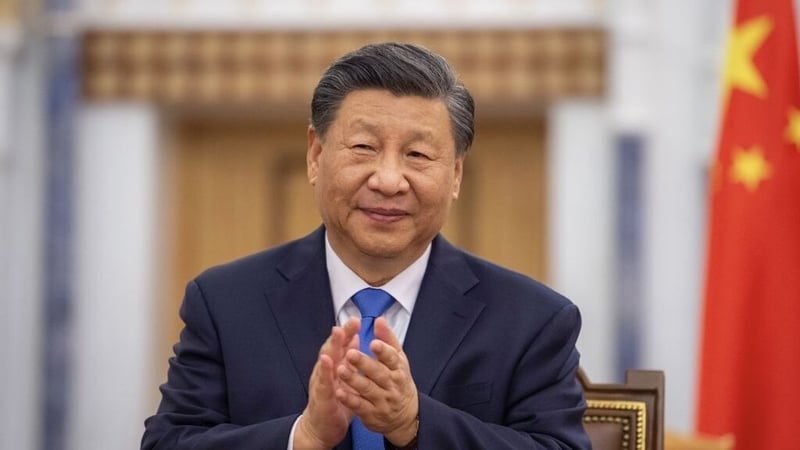After Donald Trump whacked America’s biggest trading partners, Mexico and Canada, with punitive tariffs, plunging the stock market into the red and allies into fear they’d be next, he turned his attention to his old arch-rival: China.
But in comparison to the 25% slapped on goods coming from his North American neighbours – for now on pause for a month – the 10% applied to Chinese imports seemed positively restrained.
There may have been an Elon Musk factor at play, analysts suggested. The world’s richest man and self-declared “first buddy” to Donald Trump has deep business interests in China.
Or it could, of course, just be the opening salvo.
After all, Mr Musk aside, Donald Trump has stacked his cabinet with a few “China hawks”, notably Secretary of State Marco Rubio – twice sanctioned by the Chinese regime for criticising China’s policies in Xinjiang and Hong Kong.
And, if past is prologue – to the extent it can be under the current administration – Trump’s first term offers a few hints.
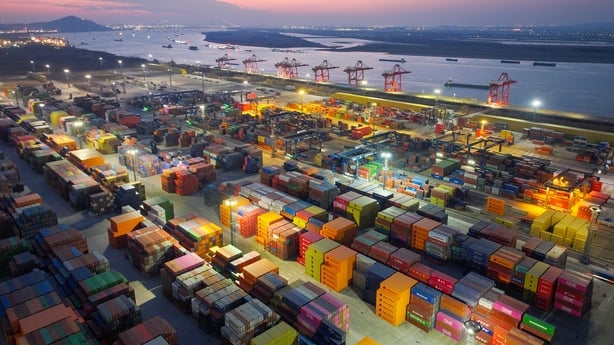
During the last Trump presidency, while I was reporting in Beijing, the US-China tit-for-tat trade war raged, ratcheting up economic pain on consumers and businesses in both countries.
This week, China said it didn’t want another trade war, but it was clear it was prepared for one – Beijing immediately unleashed a battery of counter-measures targeting American companies.
And while it’s foolish for anyone to claim they know what China’s secretive leaders really think about Mr Trump, there’s reason to believe they may see his aggressive foreign policy as something of an opportunity.
The United States has been at the helm of the so called “rules-based international order” since the end of World War II – one where countries abide by established norms and treaties on trade and territorial integrity.
We need your consent to load this comcast-player contentWe use comcast-player to manage extra content that can set cookies on your device and collect data about your activity. Please review their details and accept them to load the content.Manage Preferences
But Donald Trump has spent much of the past two weeks ripping up the rulebook, possibly handing Beijing the chance to rewrite it in its own interests. China has, for example, long sought to shift the emphasis from liberal universal values based on individual freedoms at the heart of the international order to the alternative rights of development and economic prosperity.
It’s certainly a moment for Beijing to project an aura of calm in an era of chaos, looking, as one diplomat put it, like “the adult in the room”.
Indeed when China took over the presidency of the UN Security Council this week, the Chinese envoy appeared to cast China as a steady ship in choppy waters.
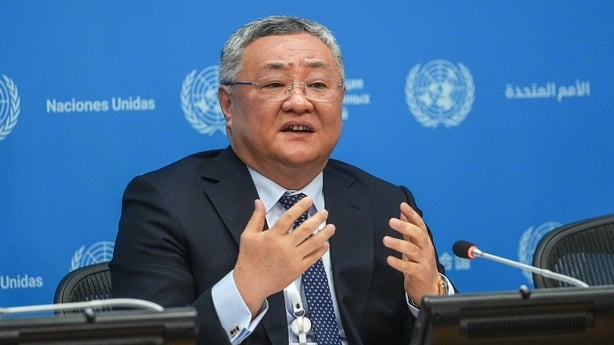
“The world is entering a very turbulent period,” China’s UN envoy, Fu Cong, said as he assumed the gavel on Monday, urging cooperation between the world’s two biggest countries on matters of global importance like climate change and AI.
“There’s no winner in a trade war,” he said.
But could China actually end up winning?
Certainly, beyond trade, the US government’s sudden closure of USAID (United States Agency for International Development) gives China the opportunity to burnish its own global development credentials.
Ambassador Fu said China would continue its effort through the Belt and Road Initiative – China’s global infrastructure investment plan – to achieve “better development” in the Global South. Although, this was after Panama announced it was withdrawing from the Belt and Road agreement, under pressure from Washington.
“We have scored an own goal,” Prof Chris Barrett, an economist at Cornell University, told RTÉ News.
It’s not just tariffs that are the issue, he said – it’s shutting off aid, withdrawing from the World Health Organisation, and the Paris Climate Agreement.
“It’s hard to overstate the adverse effect on goodwill towards the United States as a result of these sorts of actions,” he said. “We are already in an intense competition with China, to a lesser degree, with Russia, in much of the Global South”.
He said he anticipated governments, especially in sub-Saharan Africa, where there are rare minerals crucial to the tech industry, would choose to do deals with China rather than the United States.
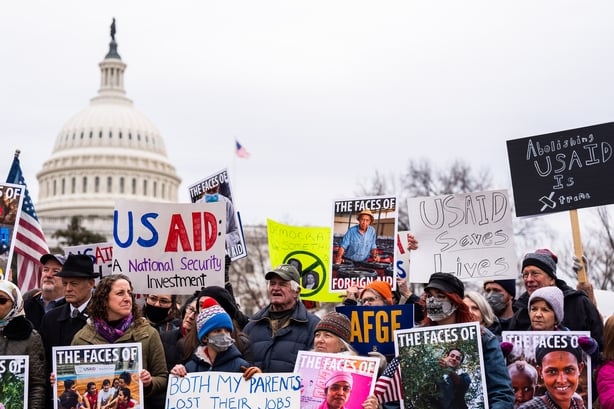
“Our advantage of being a trusted partner is gone,” he said. “So now, we are competing on the same transactional terms as China is.”
Similarly, the US President’s flirtation with territorial expansion – think Greenland, Panama, Canada and even, it would now seem, Gaza – could be a win for China.
It’s certainly useful cover for Beijing as it quietly builds settlements inside the boundary of the Himalayan kingdom of Bhutan, consolidates its foothold in areas of the South China Sea claimed by other nations and mulls annexation of self-ruling Taiwan.
“Mr Trump’s trade posturing and territorial rhetoric will accelerate China’s efforts to reshape and bifurcate the global order,” Velina Tchakarova of FACE geopolitical risk consultancy in Vienna told RTÉ News.
It’s likely to expand the alternative trade agreements, like BRICS+, that are outside US influence, she said.
BRICS+ is a grouping of non-western nations including Brazil, Russia, India, China, South Africa and five others, set up largely as a counterweight to what the members see as too much American and European dominance of global institutions, like the World Bank and the UN Security Council.
It also aims to reduce reliance on the US dollar in global markets – something a US-led trade war is likely to promote.
“[Mr Trump’s] aggressive economic confrontations with the Global South will push more countries toward “dedollarisation”, Ms Tchakarova said.
The US dollar remains the world’s dominant currency but is has lost some of its market share in recent years to other national currencies – including the Chinese yuan.
But countries observing Trump’s more aggressive foreign policy should be wary of thinking China offers a more stable alternative, said Isaac Stone Fish, CEO and founder of Strategy Risks, a business intelligence firm.
“I think there’s a common mistake that governments and investors make with taking what Beijing says at face value,” he said.
“There’s a real difference between Chinese propaganda and Beijing’s actual strategy,” he added.
“Beijing loves other countries advancing China’s interests,” he said, but Beijing’s see foreign policy through the prism of “what is good for Beijing”.
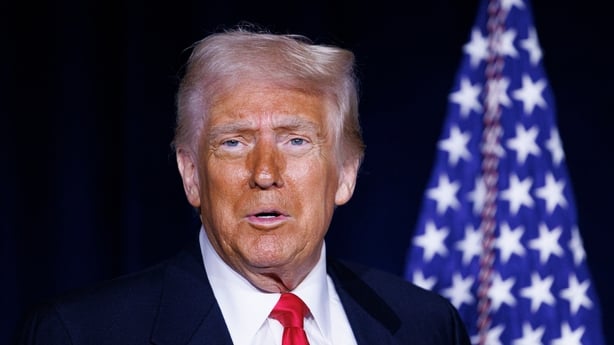
Like the US under Trump, Beijing is no stranger to aggressive economic coercion itself, especially when trading partners refuse to toe the Communist Party line.
When, in 2020, the then-Australian leader Scott Morrison called for an independent investigation into the origins of the Covid 19 pandemic – which broke out in Wuhan, China and went on to kill some seven million people worldwide – the Chinese regime was apoplectic.
Chinese state media outlets foamed at the mouthpiece, slamming Australia as “gum stuck to the bottom of China’s shoe”.
Steep tariffs on Australian exports to China including timber, barley, beef, cotton, wine, and lobster quickly ensued, prompting Australia to lodge a complaint with the World Trade Organisation, as China did this week over Mr Trump’s tariffs.
Years before that, when the Norwegian committee awarded the Nobel Peace Prize to Chinese democracy activist Liu Xiaobo, China plunged economic and diplomatic relations with Norway into the deep freeze. Shipments of Norwegian salmon rotted in Chinese warehouses as import contracts were torn up.
Those two trading relationships took years of diplomatic grovelling to Beijing to restore.
But, as Trump’s America appeared to turn its back on the “rules-based international order” – largely credited with maintaining stability for the past eighty years – traditional allies in Europe were left reeling, wondering what Washington had in store for them.
“Europe faces a stark choice – either align more closely with the US through deeper economic integration and defense commitments,” said Ms Tchakarova, or “seek limited geoeconomic gains with China, such as reviving CAI”.
CAI was the “comprehensive EU-China investment agreement” drafted in 2020 but mothballed after China sanctioned Members of the European Parliament – also over their criticism of China’s human rights abuses in Xinjiang and Hong Kong.
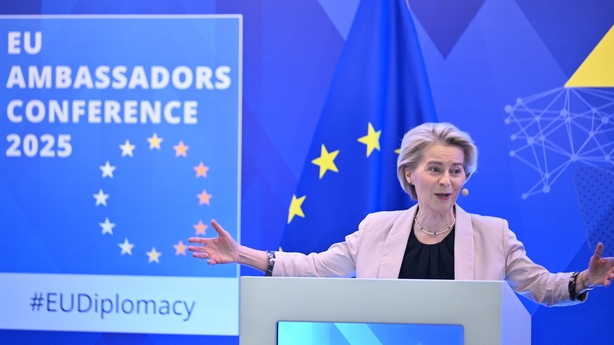
Beijing has sought to drive a diplomatic wedge between Brussels and Washington especially on issues critical of China – like human rights.
With Trump back in power across the water, will this be its chance to warm up its relations with Europe after a chilly spell?
“If I were in Brussels, I would try to remember both that there’s a way to work with the Trump administration and that this will be only four years,” said Mr Stone Fish.
“Muscular authoritarianism” under the Chinese Communist Party will last a lot longer than that, he said.
Also, China’s continued support for Russia as it pursues its assault on Ukraine certainly won’t be forgotten by Europeans any time soon.
Nevertheless, it was clear this week that some EU leaders were already softening their tone.
“I think we can find agreements that could even expand our trade and investment ties,” European Commission President Ursula von der Leyen told a meeting of EU ambassadors.
“It is a fine line that we need to walk, but it can lead us to a fairer and more balanced relationship with one of the world’s economic giants,” she said, “and that can make sense for Europe.”
That would have been music to Beijing’s ears – and surely counts as another win for China, just three weeks into the Trump presidency.

